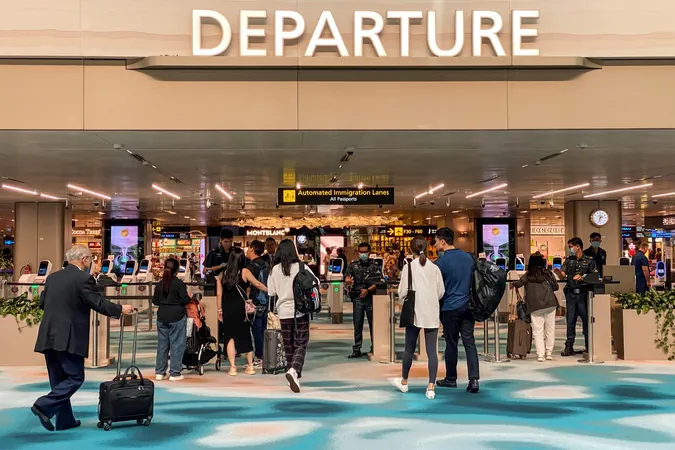
Singaporeans Voice Frustration Over Changi Airport Fee Increases
2024-11-10
Author: Rajesh
Singaporeans Voice Frustration Over Changi Airport Fee Increases
SINGAPORE: Recent announcements regarding fee hikes for both travelers and airlines at Changi Airport have sparked a wave of dissatisfaction among Singaporeans grappling with the rising cost of living. The latest updates reveal that the Passenger Service and Security Fee (PSSF) for departing passengers will jump from S$46.40 to S$58.40 by 2030. This increase will occur gradually, with a S$3 rise every April from 2027 to 2030.
For airlines, effective April 25, increased landing, parking, and aerobridge charges will be implemented. However, the first half of this year will see a 50% rebate on these new fees, providing some temporary relief for operators.
Transit passengers are also set to feel the pinch, as their current PSSF of S$6 will undergo increases of S$3 each April from 2025 to 2027, followed by a S$1 rise from 2028 to 2030, ultimately converging at S$18.
The Changi Airport Group and the Civil Aviation Authority of Singapore (CAAS) justified these price adjustments, citing the need to fund substantial investments in infrastructure enhancements, including upgrades to Terminal 3 and the addition of new Skytrain cars. The organizations also noted that escalating operational costs, particularly for energy and manpower—exacerbated by rising wages in line with national policies such as the progressive wage model—played a significant role in necessitating these fee hikes.
Despite some understanding among the public regarding the need to maintain Changi's competitive edge in the region, many Singaporeans expressed their discontent online. Comments like "Pay and pay!" and "Increase increase increase" dominated conversations, reflecting a sentiment of collective frustration.
Critics highlight that middle-class Singaporeans will face the brunt of these increases, as they rely heavily on the airport for both leisure and business travel. There are concerns that the higher fees could deter foreign visitors, potentially impacting Singapore's economy adversely.
Some individuals have suggested alternative travel options, such as flying out of Johor's Senai International Airport, especially with the anticipated completion of the Rapid Transit System (RTS) link, which could facilitate easier access to Malaysia.
In light of these developments, Singaporeans are increasingly vocal about their dissatisfaction, viewing the situation as indicative of a broader issue with rising living costs in the nation. Will increased airport fees drive travelers away or could it be a necessary step towards modernization? Only time will tell as these changes unfold.




 Brasil (PT)
Brasil (PT)
 Canada (EN)
Canada (EN)
 Chile (ES)
Chile (ES)
 España (ES)
España (ES)
 France (FR)
France (FR)
 Hong Kong (EN)
Hong Kong (EN)
 Italia (IT)
Italia (IT)
 日本 (JA)
日本 (JA)
 Magyarország (HU)
Magyarország (HU)
 Norge (NO)
Norge (NO)
 Polska (PL)
Polska (PL)
 Schweiz (DE)
Schweiz (DE)
 Singapore (EN)
Singapore (EN)
 Sverige (SV)
Sverige (SV)
 Suomi (FI)
Suomi (FI)
 Türkiye (TR)
Türkiye (TR)